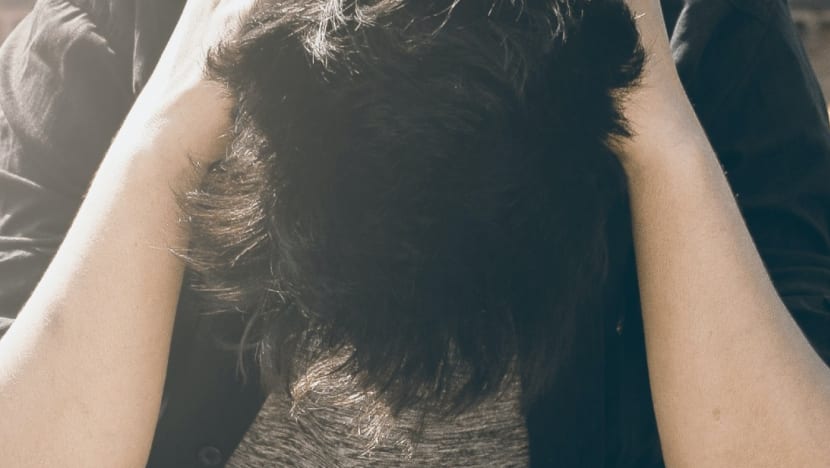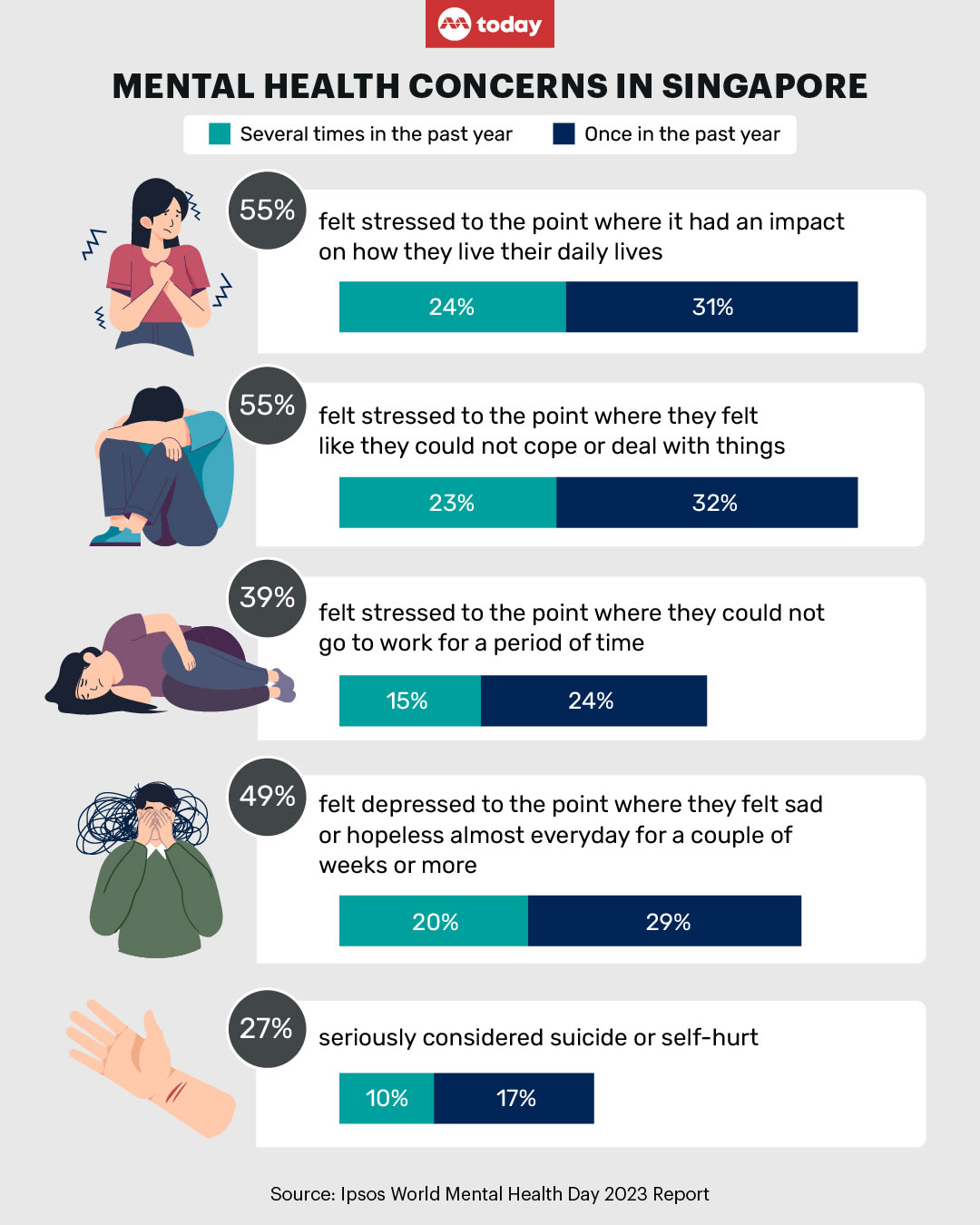1 in 4 youth considered self-harm in past year, 1 in 2 Singaporeans’ daily lives affected by stress: Mental health survey

SINGAPORE — More than half of Singaporeans said they have experienced stress that affected how they lived their daily lives in the past year, while one in four young adults under the age of 35 said that they have seriously considered self-harm or suicide at least once.
Almost two in five people said that they had to take time off work due to stress in the past year, with three in 20 people saying that they had to do this on multiple occasions.
These were the findings from a survey by market research firm Ipsos, in its Ipsos World Mental Health Day 2023 Report published on Monday (Oct 9).
World Mental Health Day falls on Oct 10.
The survey was done across 31 countries to explore changes in how people felt about their own mental health and the factors affecting their mental well-being.
The Singapore segment of the survey was done online over two weeks with about 1,000 Singaporeans aged 21 to 74.
WHAT SINGAPOREANS SAY
Chief among Singaporeans’ list of healthcare concerns was their mental health — with close to half considering mental health one of the biggest health problems facing the country today.
Respondents were asked to choose up to three options from a list of 13 healthcare concerns, including diabetes, obesity, dementia and Covid-19.
The highest proportion of respondents chose mental health (46 per cent) ahead of cancer (38 per cent) and stress (35 per cent).
Although nearly eight in 10 Singaporeans (78 per cent) thought that their mental health was as important as their physical health, just slightly more than half (54 per cent) said that mental and physical health were treated equally by Singapore's healthcare system — up from 43 per cent in 2021.
Other notable findings from the report include:
- About a quarter of the Singaporeans said that on several occasions in the last 12 months, they had felt stressed to the point where it had an impact on how they lived their daily lives (24 per cent), and to the point where they felt like they could not cope or deal with things (23 per cent)
- Almost half (49 per cent) of the Singaporeans reported feeling depressed to the point that they felt sad or hopeless almost every day for weeks at a time. One in five said that they have felt this way on multiple occasions in the past year
- One in 10 people have seriously considered suicide or self-hurt on multiple occasions in the past year
- Singaporeans are more likely to say that they often think about their physical health (66 per cent) than their mental well-being (52 per cent)
- Four in 10 (44 per cent) Singaporeans said that they never or did not think very much about their mental well-being

Dr Timothy Singham, a clinical psychologist with Viriya Community Services, said that some of the survey’s findings were “extremely worrying”.
This is particularly so for the one concerning young adults’ mental health, with more than a quarter reporting that they considered suicide or self-harm at least once in the past year.
“This highlights the need for mental health services to better understand the many potential interacting stressors that this age group is going through,” he added.
In a similar vein, Ms Melanie Ng, director of public affairs for Ipsos in Singapore, said in a press statement that it is “indisputable that employers, governmental bodies, and communities must heighten their commitment towards enhancing preventative mental health care”.
“These figures are worrying because they continue to remain high despite greater awareness for self-care and community support,” she added.
“Quite a considerable population of Singaporeans admitted to seldom or never focusing on their mental well-being, a tendency that may be attributed to the high-stress, relentless rhythm of life in Singapore.”
Dr Singham said that the survey results were “not totally surprising” because he has observed “a sharp rise” in demand for mental health services on the ground across all age groups, particularly among young adults.
Indeed, in the Ipsos global report comprising data collected from all 31 countries, it found that younger people appeared to think more about their mental health than their older counterparts.
About 13 in 20 respondents (65 per cent) under the age of 35 said that they thought about their own mental well-being often in 2023, compared to 48 per cent for those from the 50 to 74 age range.
Overall, 44 per cent of Singaporeans indicated that they never or did not think very much about their mental well-being.
SINGAPORE’S NEW MENTAL HEALTH STRATEGY
Last Thursday, the Government announced the launch of the National Mental Health and Well-being Strategy, which aims to build up the country’s mental health ecosystem to offer accessible clinical care to people who need it.
Among the initiatives the Government intends to roll out is a new specialised care facility to support youth who are at risk of suicide — where they may seek refuge, free of stigma, in a safe environment for up to six months.
Some young people and mental health experts told TODAY last week that they believe the facility would be “a good option”, although concerns remain that it might make the youth-at-risk more uncomfortable to step forward and seek help if the facility draws undue attention to suicide.
As part of the national strategy, a toolkit will be developed to empower and equip parents with personalised knowledge and skills to build strong parent-child relationships, and to strengthen their children’s mental well-being and resilience.
It aims to combat any stigma parents might have against mental health conditions, with information on mental health literacy and children’s mental well-being, as well as tips on how to detect early signs of distress in children.
The Inter-agency Taskforce on Mental Health and Well-being behind the national strategy is also looking to scale up ongoing efforts to build mental and socio-emotional resilience in the young by introducing emotional development lessons in preschools.
In a recent national health survey published last month, it was found that the highest proportion of people with poor mental health were from the 18 to 29 age group.














